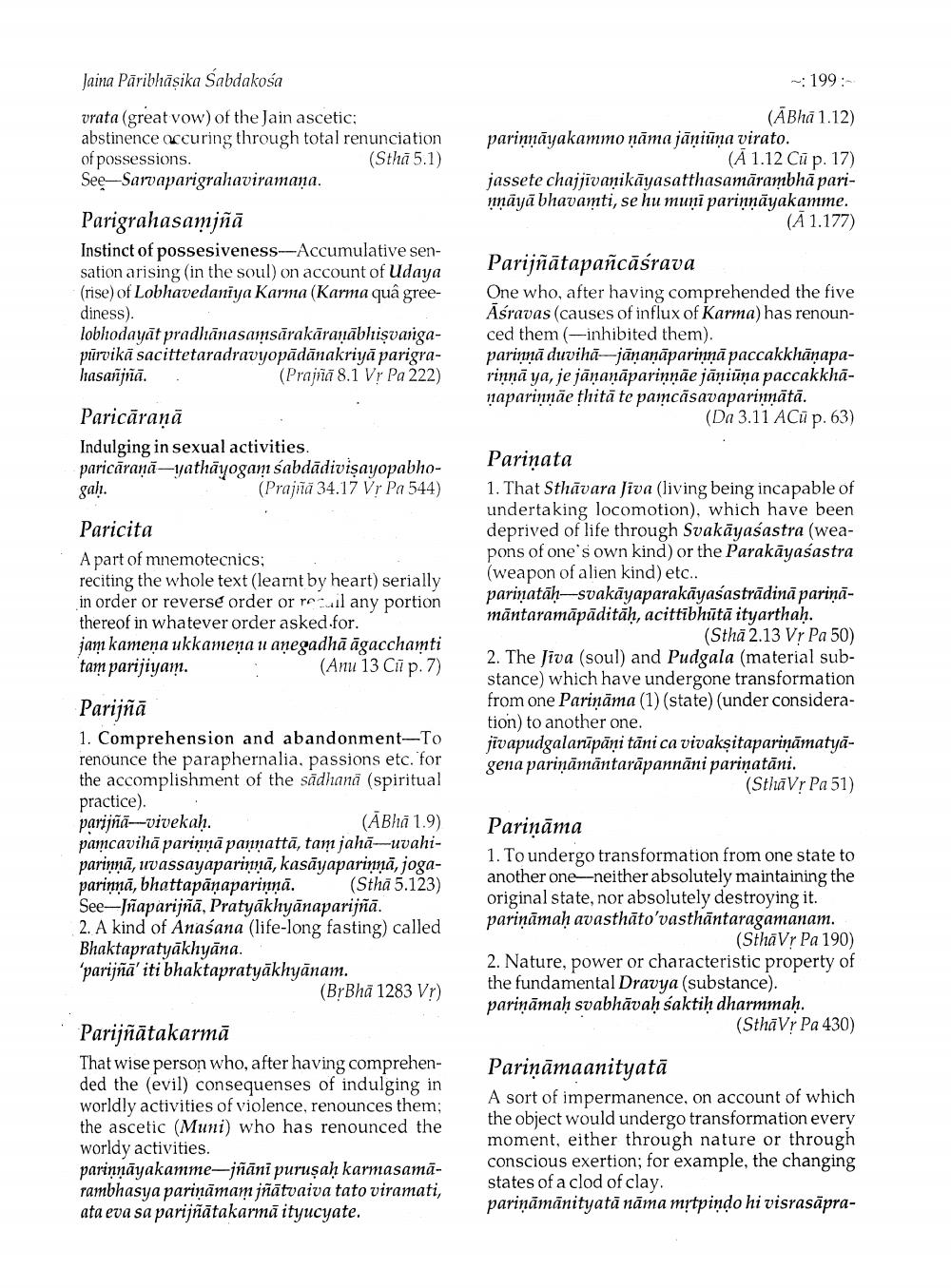________________
Jaina Pāribhāșika Sabdakosa
- 199:
vrata (great vow) of the Jain ascetic; abstinence accuring through total renunciation of possessions.
(Stha 5.1) See-Sarvaparigrahaviramana.
(ABhā 1.12) parināyakammoņāmajāņiūņa virato.
(A1.12 Cū p. 17) jassete chajjivanikāyasatthasamārambhā pariunāyā bhavamti, se hu muni parinnāyakamme.
(A1.177)
Parigrahasamjñā Instinct of possesiveness-Accumulative sensation arising (in the soul) on account of Udaya (rise) of Lobhavedaniya Karma (Karma quâ greediness). lobhodayāt pradhānasamsārakāraṇābhişvarigapurvikā sacittetaradravyopādānakriyā parigrahasanjnā.
(Prajā 8.1 Vr Pa 222)
Parijñātapañcāśrava One who, after having comprehended the five Asravas (causes of influx of Karma) has renounced them (inhibited them). parinnā duviha-jāņaņāparinnā paccakkhānaparinnā ya, je jānanāparinnāe jāniūna paccakkhāqaparinnāe thitā te pamcāsavaparinnātā.
(Da 3.11 ACú p. 63)
Paricāraņā Indulging in sexual activities. paricāraņā-yathāyogam sabdādivişayopabhogah.
(Prajitā 34.17 Vr Pa 544)
Paricita A part of mnemotecnics; reciting the whole text (learnt by heart) serially in order or reverse order or re-ul any portion thereof in whatever order asked.for. jam kamena ukkamena u anegadhā āgacchamti tamparijiyam.
(Anu 13 Cū p. 7)
Parinata 1. That Sthāvara Jiva (living being incapable of undertaking locomotion), which have been deprived of life through Svakāyasastra (weapons of one's own kind) or the Parakāyasastra (weapon of alien kind) etc.. parinatāh-svakāyaparakāyasastrādinā pariņāmāntaramāpāditāḥ, acittībhūtā ityarthah.
(Sthā 2.13 Vr Pa 50) 2. The Jiva (soul) and Pudgala (material substance) which have undergone transformation from one Parināma (1) (state) (under consideration) to another one. jivapudgalarūpāņi tāni ca vivaksitapariņāmatyagena pariņāmāntarāpannāni pariņatāni.
(SthāV? Pa 51)
Parijñā 1. Comprehension and abandonment-To renounce the paraphernalia, passions etc. for the accomplishment of the sadhana (spiritual practice). parijna--vivekah.
(ĀBhā 1.9) pamcavihā parinnā pannattā, tam jahā--uvahiparinnā, uvassayaparinnā, kasāyaparinnā, jogaparinnā, bhattapānaparinnā. (Stha 5.123) See-Jñaparijñā, Pratyākhyānaparijñā. 2. A kind of Anasana (life-long fasting) called Bhaktapratyākhyāna. 'parijñā' iti bhaktapratyākhyānam.
(BrBhā 1283 Vr)
Pariņāma 1. To undergo transformation from one state to another one-neither absolutely maintaining the original state, nor absolutely destroying it. pariņāmaḥ avasthāto'vasthāntaragamanam.
(SthāV? Pa 190) 2. Nature, power or characteristic property of the fundamental Dravya (substance). parināmah svabhāvaḥ saktiḥ dharmmah.
(SthāVr Pa 430)
Parijñātakarmā That wise person who, after having comprehended the (evil) consequenses of indulging in worldly activities of violence, renounces them; the ascetic (Muni) who has renounced the worldy activities. pariņņāyakamme-jñāni puruṣaḥ karmasamarambhasya pariņāmam jñātvaiva tato viramati, ata eva sa parijñātakarmā ityucyate.
Pariņāmaanityatā A sort of impermanence, on account of which the object would undergo transformation every moment, either through nature or through conscious exertion; for example, the changing states of a clod of clay. pariņāmānityatā nāma mrtpindo hi visrasāpra




